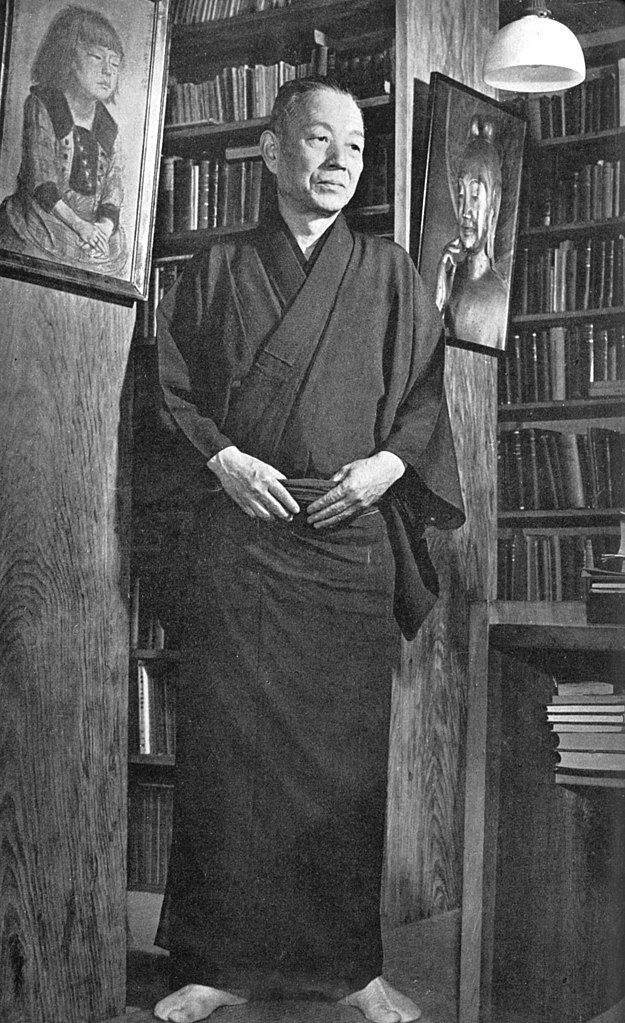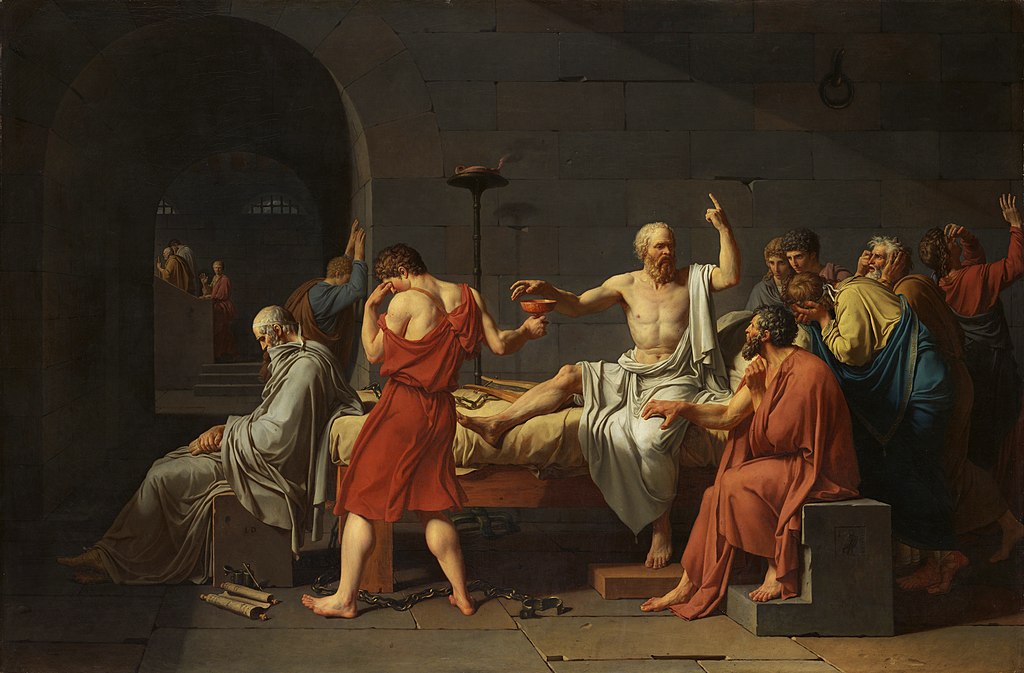
“To be a person is to live in the midst of aidagara and to authenticate it as such by preserving the two poles of the individual (nin) and the collective (gen)” (Thomas P. Kasulis)
In “The Dialectical Nature of Watsuji’s Ethics,” the basic contours of Watsuji’s ethics were presented using two rather common Japanese concepts – that of ningen, meaning human being, and aidagara, meaning betweenness.” Given that ningen combines the word nin (the individual person) and gen (the social person), the path to a mature ethical life was described as a dialectical process whereby nin is negated to open up to gen, and gen negated to restore nin, through the self-negating activity of betweenness, which, for Watsuji is another name for emptiness. In part to illustrate this dialectical process, Thomas Kasulis, whose chapter on Watsuji’s ethics I have used as a source, described the series of self-negations of our individual side and our social side we all go through as we grow from birth to become morally mature adults.
In “Ethics as Changing Interrelations,” it is made clear that the tension between the nin and gen of ningen must be maintained. “To be an individual is to be an-individual-as-opposed-to-the-social; to be the social is to be the-social-as-opposed-to-being-an-individual. If either pole were to completely eradicate the other, neither pole could exist.” We also come to realise that, for Watsuji, it is not enough to behave properly or do nothing wrong, as we tend to see it in the West. Kasulis tells us that, for Watsuji, “there is no ethics in simply maintaining a status quo because ethical conduct entails changing the status quo of present interrelations. An ethical agent is always, in that respect, an agent of change.” So the ethical could be called a “disposition,” a way to approach life, rather than an abiding by a set of precepts or commandments. In fact, Kasulis remarks that this “change can be either to make the interrelational bonds stronger or to subvert them.”
Kasulis interprets this last sentence as “to act morally, you must either be actively changing yourself for the sake of society or actively changing society for the sake of your individual freedom. If you are not doing one or the other, there is no moral conduct involved, only amoral movement or change.” He also points out that “Watsuji, explicitly rejects a common western notion ethical human relations arise from trust. Instead he claims that trust is a product of being authentic to the inherent ‘laws’ of relationality implied by the concept of ningen …Once we recognize human existence as ningen, we enter into a promissory relation of being both trustworthy and trusting. To deny that would be to ignore the universal character of human existence as ningen, in effect, to be a faulty example of a human being.” He, however, adds that Watsuji is more eager to differentiate an amoral conduct – doing nothing – from a moral conduct – becoming engaged in an effort to change it, than he is to differentiate the moral from the immoral, with moral conduct not restricted to the sense of seemingly good rather than seemingly evil.
Now, Kasulis warns us that “Watsuji’s ethics is at this point on the brink of going in a direction that will be a shock to readers who are deeply vested in the discourse of mainstream western ethics” and “those very assumptions can also prevent us from truly engaging what Watsuji was trying to assert.” He also tells us that, “in the final analysis,” he “too will claim there is a logical flaw in Watsuji’s theory of ethics, but his error is far more subtle that the types of ‘problems’ that would strike a typical western ethicist who came across Watsuji’ conclusions.”
Socrates

Kasulis takes the example of Socrates, who, though he had been “a loyal citizen and military hero who fought in defense of Athens, subsequently developed a critical method and personal point of view that put him at odds with the social status quo in his city-state. Through his public philosophical interrogations, he was being true to himself (“know thyself” was his motto). Yet, his public questioning revealed that the generals (like Laches) did not know what courage is, the preachers (like Euthyphro) what piety is, or the sophists (like Gorgias) what rhetoric is.” Though, in Watsuji’s view, Socrates did not choose the amoral path of “dropping out of the social space of his society (as some Cynics later did, for example) … through his critical questioning,” he had disrupted “the harmony and stability of his society’s status quo.” This, Kasulis says, “cost Socrates his personal freedom: first incarceration, then trial, and finally execution … [he] freely chose to ignore his personal welfare … In asserting his individual convictions, Socrates used the nin pole of his human identity to try to negate the uncritical and unreflective status quo of his society, the gen pole of his human identity. Subsequently, having failed to change the public value system of Athenian society, he freely submitted his individual freedom and his very life to the moral and political authorities to whom he owed his trust (the gen pole of his being a loyal Athenian).”
Kasulis says that Watsuji would have been in total agreement with Socrates’s willingness to accept his execution as punishment for having disrupted the social life of Athens. But he also points out that we today, knowing that Socrates’s disruption turned out to be a good thing for Western culture, may come to a different conclusion as to the fairness of his trial and execution. He writes: “Socrates’s behavior did eventually transform Greek society, leading toward a new collective identity … At that point the Athenians (indeed western culture at large) came to designate Socrates as good. Watsuji would say that after society changed, Socrates’s conduct had posthumously become good.” The point here is that, unlike the subsequent Christian that shaped European culture, “because Watsuji’s system denies a transcendent source of principle or divine commands, normative evaluation belongs in the collective (gen) pole of our humanity. When society adjudicates an action to be good, it is by definition good; when it adjudicates it to be evil, it is evil.”
Kasulis writes: “Such an interpretation runs counter to how ethics is typically viewed in western accounts. Those western evaluations see Socrates as a good man who saw evil in his society and, at great cost to himself, created a positive change against what had been evil about that society. Watsuji, however, found such explanations circular or wongheaded … The only answer would seem to be because the society was in some sense bad … it was good for Socrates to point that out and act to change it.”
Then, Kasulis asks: “Who or what determines what is good or bad about a society?” Good question, one would now reply! If some set of criteria decides it, who picks the criteria? Suppose it is God or some other transcendent source of value that sets the criteria for distinguishing good from evil. If so, who relates and interprets the divine mandate? … It seems that no matter how we look at it, good and evil are decided by the gen side of ningen, not either the individual or by transcendent deities or universal principles of reason.”
Well, to a point people in the West would at some point mention democracy and the ability for citizens to either vote directly on specific laws, or at least elect a representative to vote on their behalf. Greece at the time of Socrates was not at that point, (though on the way to it, but only free Athenian males were allowed to vote), and it could be that in the 1930s the ultra-nationalist Japanese government was not at that point either!
What strikes me, however, is that both Socrates and Watsuji lived in polytheistic countries, Greece in possession of a large pantheon of gods and goddesses, and Japan, likewise endowed with a native Shinto worship of myriads kami. And, though, in Greece, there was a hierarchy of deities with Zeus at the top, while in Japan, the emperor was still perceived as descended from the Sun goddess Amaterasu, the immanent origin of the divine was prevalent in both religions, while, throughout the history of the West, the transcendence of the Christian God has been by far the strongest feature of religion. As was said above, in the absence of a transcendent source of principle or divine commands, “the normative evaluation” has to be “the collective (gen) pole of our humanity.” Though we are usually taught a Christianised reinterpretation of Socrates’s idiosyncratic “method,” Socrates would have shared Watsuji’s conviction that a price had to be paid for disrupting “the harmony and stability of his society’s status quo.”
Kasulis argues that “Watsuji believed western theories were in denial about how things actually work. The Aristotelians moved moral agency from the polis (of the Politics) to the individual (of the Nicomachean Ethics); Kant ensconced the good in the universal rational laws of the categorical imperative; religious ethicists looked to a nonhuman, transcendent deity for divine mandates. All were invalid attempts to avoid the fact that we as a collective gen determine what is good or evil.”
The issue of ethical cultural relativism
Could it be, then, that Watsuji would qualify as a cultural ethical relativist in the eyes of many western ethicists? “Cultural ethical relativism” Kasulis explains, “is the theory that maintains 1) culture defines what is good or evil and 2) there are no ethical universals across cultural differences. Hence, for such relativism, what is good in one culture at one time may not be good in another culture or another time. Certainly Watsuji’s theory fits the good and evil part of the definition. The question is whether it fits the second part.”
To clarify this second part, Kasulis goes back to the meaning of the word “amoral” in the western tradition – where it refers to an action or attitude that is neither good or evil, just outside the realm of morality – and the meaning Watsuji gives the term – the refusal or inability to act because one is unable to “distinguish the universal nature of ningen, and therefore also his attendant qualities of trusworthiness, reliance, and genuineness … To be a person is to live in the midst of aidagara and to authenticate it as such by preserving the two poles of the individual (nin) and the collective (gen) … In contrast to the western definition, then, an amoral individual for Watsuji is incapable, whether by disposition or by choice, of being either good or evil. While being always subject to the definition of a society and its particular fudo, good and evil arise from a basis of authentic humanity, one which precedes cultural variation.”
Kasulis argues that, “Following that line of thought, Watsuji’s theory would seem to imply sociopathic serial killers, for ex., should be universally condemned, but not on the grounds of being evil or immoral.” Because they do not see themselves as living in the midst of ningen, they should be seen as “inhuman” rather than “evil, which is worse.”
Kasulis believes that “there is, however, one point of slippage in his account, but I think it can be fixed with an analogy from a western philosophical position. The problem is that, when he is careful, Watsuji says the determination of good and evil is based in the ningen, but he also often speaks as if the judgment about and evil lies in the gen side of ningen alone. In other words, when I said (on Watsuji’s behalf) that we decide what is good or evil, is that the we of the in-the-midst ningen, that source of differentiation and dialectical tension between the individual and collective, or is it the we of the gen side of ningen (the “society”)?
Civil disobedience as a possible parallel.
Kasulis is now turning to civil disobedience to throw more light on what he refers to as Watsuji’s “slippage.” Even in today’s best democratic society, where we, to some extent, have a say about what is legal, there are always individuals or groups of individuals who deem that some particular law is unjust. These individuals commit acts of civil disobedience, knowing those acts to be illegal and therefore expecting to be punished for them. This is “freely accepted” in the hope of improving justice in their society.

The particular example used here is that of Rosa Parks who “refused the white bus driver’s command to give up her seat and go to the back of the bus. As a “Negro” in 1955 Montgomery, Alabama, she committed what was undeniably an illegal act in that time and place. Yet, if a bus driver in that same city today tried to force a person to sit in back of the bus on the basis of race, the bus driver’s action would be illegal. In fact, Rosa Parks’ conduct was a factor in changing the society’s view of justice such that what was illegal is now legal and vice versa. It would be strange to say Rosa Parks’s conduct was legal at the time because we now consider it legal. Indeed, if Rosa Parks, and other heroic people like her, had not knowingly and self-consciously violated the law, the Jim Crow laws might never have been repealed. Parks had identified an inconstitency in the US legal system that supposedly maintained, on one hand, the principle that all people are created equal and, on the other hand, the legal enforcement of racial segregation.”
Kasulis point out that “Rosa Parks did not refuse to move simply because she was tired … she was refusing the order on behalf of society as well as herself. Indeed, in such cases the individual as nin stands opposed to one aspect of the community as gen, even while affirming one’s membership to that gen. If we substitute “good” and “evil” for “legal” and “illegal,” the analogy with Watsuji’s argument becomes clear.”
This, Kasulis notes, shows that for Watsuji, “Good and evil are, we might say, defined by the intellectual and social fudo of the time and place, and are, therefore, fluid.” I would add that in a cultural context where reality is characterised as “change,” it is to be expected that people develop an acute sensibility of the relativity of ethics to the often volatile variability of the conditions encountered in everyday life. Chinese companies are known to refuse being tied down by contracts that are held to be valid no matter what turns out to happen which changes the context within which they will have to operate. For them, as soon as some circumstance has changed, the contract is no longer valid. This is unavoidable in cultural contexts lacking a transcendental dimension, where change arise immanently from reality. Only in the western culture inherited from Greece and the Christian faith, which chose to ignore the obvious change taking place in front of their eyes to focus on a deeper reality of static Ideal Forms postulated to be eternal, can people feel authorised to set up what is a “fixed” inter-relation between two or more business partners, or even groups of partners.
The example of civil disobedience, Kasulis continues, has allowed us to “better understand the shift in the meaning of the “we” as what determines good and evil in Watsuji’s ethics. On one hand, we can consider where “good” and “evil” come from: the source of the distinction itself. As in civil disobedience’s view of the law, good is always in the process of being defined in the mutual negating functions of the individual pole of our existence vs. the social pole. So, in that sense, “we” is the being in the midst of “I” and “the society,” and that may require doing or saying what is “not good” as presently defined. On the other hand, we can consider who finally articulates (in the present betweenness) the consensus of the society about what is good or evil. In that case, the court of last resort is the society as gen. As in the legal analogy, once the Supreme Court rules that the “law of the land” is such-and-such, no individual can argue that is not the law; one can only argue for a change in the law (or its present interpretation as established by precedent). Analogously, in Watsuji’s ethics, once the society deems that something is good, the individual has no basis for saying otherwise. Rather, one can only hope (and act) to change the society.”
Kasulis concludes: “Some of us may not be comfortable with the idea that good, like law, is an evolving conception based in an ever-changing social consensus about what is right, a consensus that can be affected by the disruptive (“evil”) actions of individuals. Yet, we can now see it is at least an arguable position worthy of our understanding and evaluation.”
Source
Thomas P. Kasulis – Engaging Japanese Philosophy

